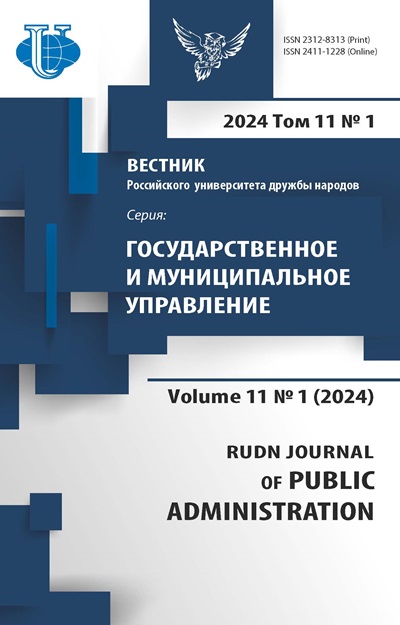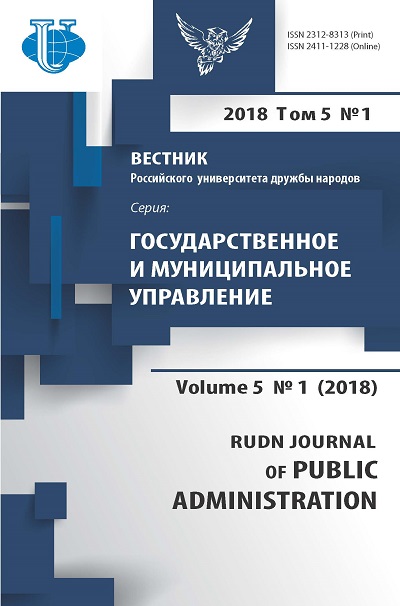DEVELOPMENT OF THE SYSTEM OF PROJECT MANAGEMENT COMPETENCIES OF STATE CIVIL SERVANTS
- Authors: Ramazanov K.N.1
-
Affiliations:
- Povolzhsky institute of Management named after P.A. Stolypin, RANEPA
- Issue: Vol 5, No 1 (2018)
- Pages: 53-60
- Section: HUMAN RESOURCES MANAGEMENT IN PUBLIC ADMINISTRATION
- URL: https://journals.rudn.ru/public-administration/article/view/19779
- DOI: https://doi.org/10.22363/2312-8313-2018-5-1-53-60
Cite item
Full Text
Abstract
The effectiveness of the activities of public authorities directly depends on the level of qualifications of their personnel, the ability and willingness of employees to resolve complex problems in the dynamically developing and more complicated conditions of reforming the system and the methods of public administration. One of these areas of reform has been the intensive introduction of project management techniques in activity of executive bodies. The implementation of the project approach has to provide maximum economic efficiency and positive social impact in conditions of limited resources, to allow to effectively manage priorities and changes in the activities of state bodies. The implementation of project management techniques in executive bodies is accompanied by a sufficiently extensive set of legal and methodical documentation, taking into account the superstructure in the form of international standards, and these documents together set a rather high “bar” in relation to the qualifications of civil servants in the scientific methodology of project activities, legal and applied competence in matters of project management. In this connection, the issue of optimization of the system of qualification requirements for civil service positions is becoming topical.
About the authors
Kamil Najmutdinovich Ramazanov
Povolzhsky institute of Management named after P.A. Stolypin, RANEPA
Author for correspondence.
Email: kn.ramazanov@gmail.com
PhD in Sociology, Associate Professor of the Department of Public Administration of the Povolzhsky Institute of Management named after Р.А. Stolypin, RANEPA
410012, Russia, Saratov, Sobornaya str., 23/25References
- Krasil’nikov D.G., YAkimova M.N. Faktory deformatsii proektnogo upravleniya v organakh gosudarstvennoy vlasti (iz opyta realizatsii gosudarstvennoy politiki v sovremennoy Rossii) // Ars Administrandi. Iskusstvo upravleniya. 2015. № 2. S. 36–48.
- Rasporyazhenie Minekonomrazvitiya Rossii № 26R-AU ot 14 aprelya 2014 g. «Ob utverzhdenii Metodicheskikh rekomendatsiy po vnedreniyu proektnogo upravleniya v organakh ispolnitel’noy vlasti» // Sayt Minekonomrazvitiya Rossii URL: http://economy. gov.ru/minec/about/structure/depStrategy/201404181 (data obrascheniya: 20.04.2018).
- Postanovlenie Pravitel’stva RF ot 15 oktyabrya 2016 g. № 1050 «Ob organizatsii proektnoy deyatel’nosti v Pravitel’stve Rossiyskoy Federatsii» // Ofitsial’nyy internet-portal pravovoy informatsii http://www.pravo.gov.ru, 18.10.2016.
- Kozhevnikov S.A. Proektnoe upravlenie kak instrument povysheniya effektivnosti deyatel’nosti organov gosudarstvennoy ispolnitel’noy vlasti // Voprosy territorial’nogo razvitiya. 2016. № 5 (35). S. 2–19.
- Uskova T.V., Kopytova E.D. K voprosu o vnedrenii proektnogo upravleniya v organakh vlasti // Problemy razvitiya territorii. 2017. № 4 (90). S. 7–27.
- Otchet zamestitelya ministra ekonomicheskogo razvitiya Rossiyskoy Federatsii L.V. Osipova ob opyte proektnogo upravleniya v organakh ispolnitel’noy vlasti i organizatsiyakh. Moskva, 2013 g. URL: http://economy.gov.ru/wps/wcm/connect/bfc0cd8040a90cf2a94dfb2af281cc1b/Vopros+№2+Otchet+ob+opyte+proektnogo+uprav leniya+v+organakh+ispolnitel’noy+vlasti+i+organizatsiyakh.pdf?MOD=AJPERES&C ACHEID=bfc0cd8040a90cf2a94dfb2af281cc1b (Data obrascheniya: 11.06.2018).
- D’yachkov T.V., Mikhaylov A.S. Kompleksnyy podkhod k organizatsii obucheniya rukovoditeley i spetsialistov proektnykh ofisov v organakh gosudarstvennogo upravleniya // Upravlencheskoe konsul’tirovanie. 2016. № 12 (96). S. 37–42.
- Metodicheskiy instrumentariy po ustanovleniyu kvalifikatsionnykh trebovaniy dlya zamescheniya dolzhnostey gosudarstvennoy grazhdanskoy sluzhby (versiya 3.2) [Elektronnyy resurs]. Sayt Ministerstva truda i sotsial’noy zaschity RF. URL: https://rosmintrud.ru/ministry/programms/gossluzhba/16/1 (Data obrascheniya: 11.06.2018).
















